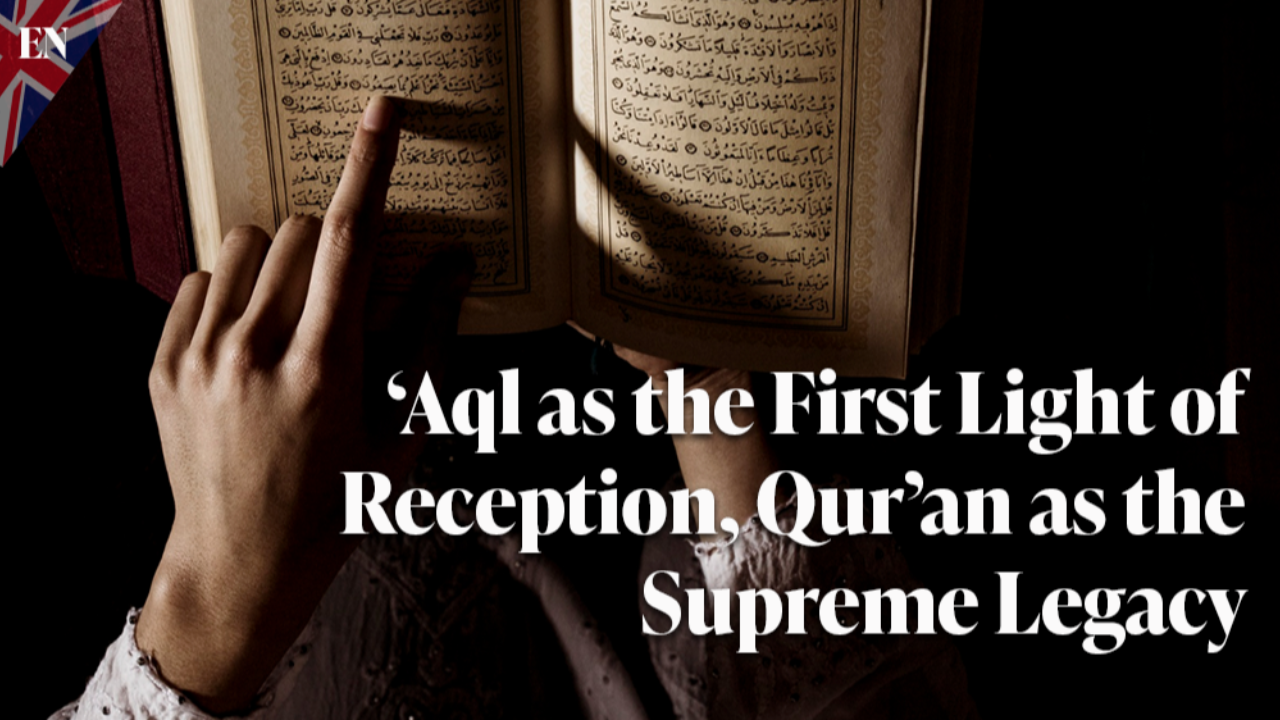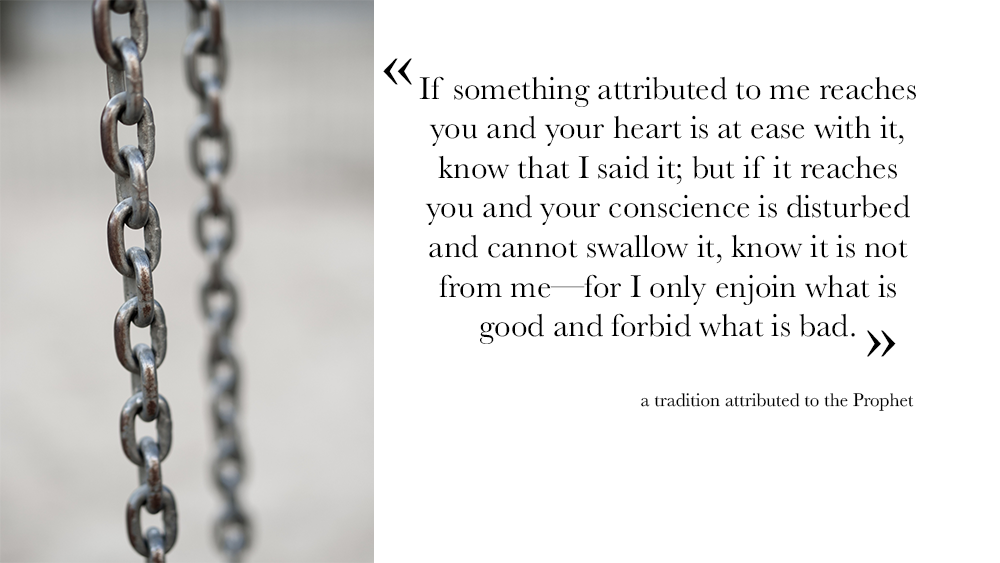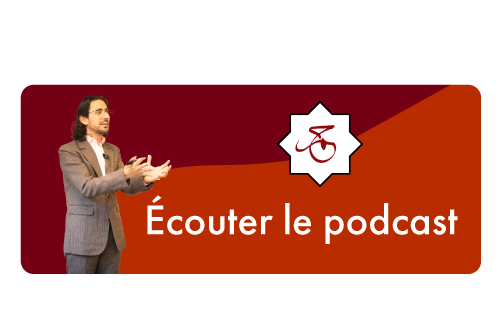
A Qur’anic Method for Weighing Ḥadīth - Without Losing a Single Nuance
Bismillāh. This question about the sunnah—the prophetic tradition, more precisely the ḥadīth: what is reported the Prophet said, did, and approved—returns again and again because it is central. Recently it has even given rise to movements. I will not label these movements good or bad; they are legitimate in the sense that they arise from people who love truth, who feel proud and joyful about their Muslim identity, who love the Prophet ﷺ, who still accept that he is a prophet, and who accept the Qur’an. Some within these movements have rejected aḥādīth altogether because, when they examined the techniques of validation and authentication, they found them poor. This is taboo for many Muslims even to consider, but the call exists—and we must open that file again.

For centuries, most people neither wrote nor read. Their “Islamicity,” their being Muslim, did not depend on texts—not even on the Qur’an. They learned Islam from the character, comportment, and presence of their parents and people around them. Our generation is different: we are literate, and yet we have lost the traditional references—we have lost the tradition itself, completely. We cannot honestly speak of a seamless “tradition” today. Even those who teach “traditional Islam” and claim a silsilah—a chain of transmission—cannot claim the chain is intact. At some point it was broken so severely that portions of it and of the method had to be reconstructed. Everyone teaching today—progressive or “traditionalist”—is teaching something they have innovated: some invent with the image of the past (and are called traditionalists), some recreate with the image of the present or the future, and some try to recreate with no fixed image—only the demand that it be authentic for this time.
⸻
1) The Golden Rule: It Must Make Sense
Before anything else: any text must make sense. If it does not, we do not proceed. This is the golden rule—indeed, a godly rule. The Qur’an presents itself as lisānan ʿarabiyyan li-qawmin yaʿqilūn—a clear Arabic speech for a people who use ʿaql, who reflect.
Now, tell me: can you imagine that the Divine Intelligence—given to grow our intelligence in Its light—would tell us to “just believe” while forbidding reflection? To say, “accept because it is from God,” whether it makes sense to you or not? We cannot imagine that. The Qur’an explicitly speaks to people who reflect; therefore any other text after the Qur’an must also make sense to people who reflect.
But be careful: “making sense” does not mean “according to my wishes.” It means according to conscience—rational, moral consciousness. My ego might not wish it and yet it still makes sense. For example, it makes sense that I share part of my wealth with the poor even if I am not yet mature enough to want to share. That is why the Qur’an—and, alongside it, the Prophets and the Saints—speak truth to tyranny: they empower rational consciousness against the immaturity of the ego.
And is there anything more dangerous, more cruel, than immaturity?
⸻
2) The First Burhān Is ʿAql, the Supreme Legacy Is Qur’an
From the Qur’an itself we learn this order: the very first burhān (criterion) is al-ʿaql—because without it one cannot even hear or receive the Qur’an. The Qur’an constantly calls human beings to use their intellect, to reflect, to rise to yaʿqilūn. In this sense, ʿaql is the first light of reception, the divinely-given faculty that allows the Qur’an to be recognized as guidance.
Then comes the Qur’an, which is the supreme and undisputed Muḥammadan legacy—scientifically and historically the most important and the most valid. Every verse of the Qur’an is mutawātir, transmitted by groups who heard it from the Prophet, then by groups from them, preserved without dispute.
Think about it: in the time of Abū Bakr and ʿUmar—indeed ʿUthmān and ʿAlī—the question was never, “What did the Prophet say about this?” It was always: “What is in Kitābu’Llāh about this?” They disagreed on many things—interpretations, tartīb, nāsikh and mansūkh—but no one said, “I never heard that verse from Rasūl Allāh.” Even the enemies agreed on the content.
So the order is:
1. al-ʿaql as the first inner revelation and criterion;
2. al-Qur’ān as the supreme outer revelation and preserved legacy.
⸻
3) How to Weigh Reports After the Qur’an
For other aḥādīth, the test is simple:
1. al-ʿaql — Does it make rational sense?
2. al-Qur’ān — Where is its root, at least its beginning, in the Book?
3. Only then look at the isnād (chain) and rijāl (reporters).
And note well: even with a Qur’anic verse, there is no rush to belief. It is not taboo to pause, to doubt, to research, and to ask “How?”—this is the duty of the light within you. Do not swallow a verse that disturbs you merely because you “must believe.”
Too often people say: “I don’t know, only God knows. I am but a poor, limited person—how could I know what God means by this or by that?”
But the Qur’an is not given to us on that basis. If the Divine had spoken in Its own language, we would understand nothing. That is why it is tanzīl—brought down into our language and rhythm so that we can make sense of it. If you cannot yet make sense of it, then it is no longer lisānan ʿarabiyyan li-qawmin yaʿqilūn for you. Stop there. Pray, breathe, ask, cry—but do not merely swallow.
And let me tell you this: the secret that opened doors of understanding for me was precisely this—I refused to swallow what made no sense. I would pray, meditate, cry if necessary—until meaning burst forth.

4) Matn Before Isnād: The Limits of Late Biographical Critique
The dominant classical methods prioritized the isnād (chain). But tell me, how can you judge people six, seven, eight generations before you? A muḥaddith can scrutinize narrators of his own time, perhaps even the immediate previous generation through living witnesses. Beyond that? Between al-Bukhārī and the Companions there are six to nine generations. How can that be covered by “trust” alone?
And if kidhb (lying) and intihāl (forgery) occurred early—say in the time of Muʿāwiyah, or even before, in the time of Marwān, who in ʿUthmān’s era sent questionable letters/teachings in his name—who would catch it? Once the public swallows a report, it enters the stream and hardens into “what everyone knows.”
That is why the matn must come first.
Also, do not build your dīn on reputations or crowds. The Qur’an warns plainly: “If you follow the majority on earth, they will misguide you from the path of Allāh.” That is politics, not dīn. And Imām ʿAlī warns: do not recognize truth by who follows it or how many follow it.
Consider a modern cautionary tale: L’Abbé Pierre in France. I visited his house and shrine; they even placed his cane in my hands. He was widely revered—even by the laïc—as a saintly figure. Years after his death, a fitna of allegations erupted; the man could not defend himself. Overnight, for many, he shifted from icon of compassion to symbol of abuse. Was he a saint? an abuser? neither? The truth is lost. That is how fragile reputation-based judgment is.
Hence my order:
1. al-ʿaql (Does it make sense?),
2. al-Qur’ān (Does it concord with the Book?),
3. only then the isnād/rijāl (Who said it?).
And there is a tradition attributed to the Prophet—its meaning aligns with both ʿaql and Qur’an—whose sense is: If something attributed to me reaches you and your heart (your conscious moral intelligence, not whims) is at ease with it, know that I said it; but if it reaches you and your conscience is disturbed and cannot swallow it, know it is not from me—for I only enjoin what is good and forbid what is bad.
In spirit, this is an invitation to use ʿaql and nūr—a matn test before names and numbers.
⸻
5) Applying the Method: “Five Pillars,” Ḥadīth Jibrīl, and the Question of Identity
Take “Buniya l-Islām ʿalā khams” alongside Ḥadīth Jibrīl listing Islam’s five pillars. Really—does it make sense that an entire prophetic teaching stands on five rituals? Where are honesty, sincerity, loyalty, futuwwa—the core human qualities? At the very least, pause. Something is missing.
Turn to the Qur’an. There, al-Islām names a spiritual state of surrender—claimed by Ibrāhīm, by ʿĪsā, and others—not the formal identity of the Muḥammadan community. The Qur’an addresses the Prophet’s followers as “yā ayyuhā lladhīna āmanū” (the muʾminūn, those who trust). So “Islām” in the Qur’an ≠ “Islam” as a later communal brand. Either the word has two referents (normal in Arabic), or something in transmission/understanding is off.
A likely repair that preserves coherence with the Qur’an: the reports intended shaʿāʾir (ritual symbols). Read them as: the shaʿāʾir of this dīn are five, or the pillars of the shaʿāʾir are five. That makes sense: rituals are symbol-pillars, not the whole edifice of prophetic teaching. The Qur’an frames following Muḥammad ﷺ as īmān (a chosen trust), while Islām names the higher existential state of surrender.
Now the isnād question. These two “spine” reports (Buniya l-Islām and Ḥadīth Jibrīl) funnel through narrow channels that stop with particular individuals. If truly foundational, we should expect many Companions to narrate them—especially the dramatic scene of Jibrīl in the mosque. The report itself says the mosque was full, and the Prophet later told them, “That was Jibrīl.” Imagine the excitement. Yet we effectively have only ʿUmar narrating it; then only his son from him; then later transmitters—who, over time, became untouchable idols in public imagination.
I am not accusing them of lying; I am saying a culture grew that idolized chains and names, so “they said it” became the end of inquiry.
Seen historically, the manufacture of a hard communal identity—pillars, boundaries, formalisms—risked hijacking the Muḥammadan project at its roots. The Prophet came to free people from tyrannical sultans and from the chains of religious excess, not to add new chains. The Qur’anic horizon is wider: Islām as state; īmān as chosen trust; shaʿāʾir as symbolic scaffolding—beautiful, yes, but not the essence.
⸻
6) The Three-Step Method (In Order)
1. al-ʿAql (Intellect): the first light of reception, the inner revelation that must be used—does it make sense to the rational, moral consciousness?
2. al-Qur’ān (Naql): the supreme prophetic legacy—does it concord with the Book, can we find its root there?
3. al-Isnād / Rijāl: only then, examine who transmitted it and whether they were trustworthy.
⸻
Conclusion
This method honors the Muḥammadan legacy and the Qur’an’s own call to yaʿqilūn. It protects us from the tyranny of the nafs and from the seductions of crowds, reputations, and political partisanship. It keeps us in the light of ʿaql, guided by Kitābu’Llāh, and only then does it ask us to consider who said what.
And if ever you are tempted to say, “I don’t know, only God knows, I am too small to understand,” remember: the Qur’an did not descend on that basis. It descended to your measure, in your tongue, for you to reflect and to know!


